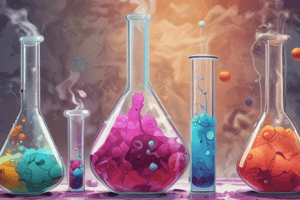Podcast
Questions and Answers
What is the minimum energy required for a chemical reaction to occur?
What is the minimum energy required for a chemical reaction to occur?
- Concentration
- Pressure
- Activation Energy (correct)
- Surface Area
Which type of chemical reaction involves the combination of two or more substances to form a new compound?
Which type of chemical reaction involves the combination of two or more substances to form a new compound?
- Decomposition Reaction
- Synthesis Reaction (correct)
- Combustion Reaction
- Replacement Reaction
What is the role of catalysts in chemical reactions?
What is the role of catalysts in chemical reactions?
- To slow down the reaction
- To increase the yield of products
- To speed up the reaction (correct)
- To change the reaction pathway
Which factor affects the rate of reaction by increasing the frequency of collisions between particles?
Which factor affects the rate of reaction by increasing the frequency of collisions between particles?
What is the term for the symbolic representation of a chemical reaction?
What is the term for the symbolic representation of a chemical reaction?
Which type of chemical reaction involves the reaction of an acid with a base to produce a salt and water?
Which type of chemical reaction involves the reaction of an acid with a base to produce a salt and water?
What is the term for the substances that undergo a chemical change?
What is the term for the substances that undergo a chemical change?
Which of the following factors does NOT affect the rate of reaction?
Which of the following factors does NOT affect the rate of reaction?
What is the theory that explains how chemical reactions occur?
What is the theory that explains how chemical reactions occur?
Which type of chemical reaction involves the breakdown of a single compound into two or more substances?
Which type of chemical reaction involves the breakdown of a single compound into two or more substances?
Flashcards are hidden until you start studying
Study Notes
Types of Chemical Reactions
- Synthesis Reactions: Two or more substances combine to form a new compound.
- Example: 2H2 + O2 → 2H2O
- Decomposition Reactions: A single compound breaks down into two or more substances.
- Example: 2H2O → 2H2 + O2
- Replacement Reactions: One element replaces another element in a compound.
- Example: Zn + CuSO4 → ZnSO4 + Cu
- Combustion Reactions: A substance reacts with oxygen to produce heat and light.
- Example: 2CH4 + 3O2 → 2CO2 + 3H2O
- Neutralization Reactions: An acid reacts with a base to produce a salt and water.
- Example: HCl + NaOH → NaCl + H2O
Characteristics of Chemical Reactions
- Chemical Equations: A symbolic representation of a chemical reaction, using formulas and arrows to indicate the reactants and products.
- Reactants: The substances that undergo a chemical change.
- Products: The substances formed as a result of a chemical reaction.
- Activation Energy: The minimum energy required for a chemical reaction to occur.
- Catalysts: Substances that speed up a chemical reaction without being consumed or altered.
Factors Affecting Chemical Reactions
- Concentration: Increasing the concentration of reactants can increase the rate of reaction.
- Temperature: Increasing the temperature can increase the rate of reaction.
- Surface Area: Increasing the surface area of reactants can increase the rate of reaction.
- Pressure: Increasing the pressure can increase the rate of reaction.
- Catalysts: The presence of catalysts can increase the rate of reaction.
Chemical Reaction Rates
- Rate of Reaction: The speed at which a chemical reaction occurs.
- Collision Theory: The theory that chemical reactions occur when particles collide with sufficient energy.
- Factors Affecting Rate: Concentration, temperature, surface area, pressure, and catalysts can affect the rate of reaction.
- Rate-Determining Step: The slowest step in a chemical reaction, which determines the overall rate.
Types of Chemical Reactions
- Synthesis reactions combine two or more substances to form a new compound, e.g., 2H2 + O2 → 2H2O.
- Decomposition reactions involve a single compound breaking down into two or more substances, e.g., 2H2O → 2H2 + O2.
- Replacement reactions occur when one element replaces another element in a compound, e.g., Zn + CuSO4 → ZnSO4 + Cu.
- Combustion reactions involve a substance reacting with oxygen to produce heat and light, e.g., 2CH4 + 3O2 → 2CO2 + 3H2O.
- Neutralization reactions occur when an acid reacts with a base to produce a salt and water, e.g., HCl + NaOH → NaCl + H2O.
Characteristics of Chemical Reactions
- Chemical equations symbolically represent a chemical reaction, using formulas and arrows to indicate reactants and products.
- Reactants are substances that undergo a chemical change.
- Products are substances formed as a result of a chemical reaction.
- Activation energy is the minimum energy required for a chemical reaction to occur.
- Catalysts are substances that speed up a chemical reaction without being consumed or altered.
Factors Affecting Chemical Reactions
- Increasing the concentration of reactants can increase the rate of reaction.
- Increasing the temperature can increase the rate of reaction.
- Increasing the surface area of reactants can increase the rate of reaction.
- Increasing the pressure can increase the rate of reaction.
- The presence of catalysts can increase the rate of reaction.
Chemical Reaction Rates
- Rate of reaction is the speed at which a chemical reaction occurs.
- Collision theory states that chemical reactions occur when particles collide with sufficient energy.
- Factors affecting the rate of reaction include concentration, temperature, surface area, pressure, and catalysts.
- The rate-determining step is the slowest step in a chemical reaction, which determines the overall rate.
Studying That Suits You
Use AI to generate personalized quizzes and flashcards to suit your learning preferences.




